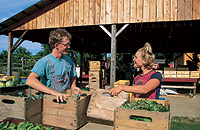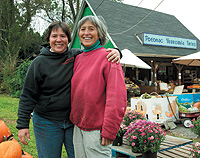


 |
Issue Contents :: Feature Stories :: Fields
Of Dreams :: Page [ 1 2 3 4 ]
"My father's father considered farming a poor
white trash activity," Hana
adds. "They'd gotten college degrees. Why eat anything but
white bread?"
 |
|
| Head farmer Andy Jones '91 and worker Jennifer Woodworth unload mesclun greens. |
Undeterred, the couple rented land from the vacant dairies near Route 7 and grew sweet corn, which Tony had noted was in high demand and low supply. Trial and error were good teachers, and by 1968, the Newcombs were farming 100 acres with the help of friends, many of them Oberlin classmates. Hana and her three siblings—Lani, Anna Newcomb Bradford '84, and Charles Newcomb '86—were valued farm hands from the beginning.
As suburbia crept toward the neighborhood, the old dairy farms became
subdivisions. In the mid-1970s, the Newcombs bought their own 30 acres
of land and established vegetable fields, berry bushes, and the farm
stand for selling produce.
Sadly, Tony lost a battle with cancer in 1984, placing the future
of the farm in doubt. It was he, after all, who had held the vision
for
the farm
and its management responsibilities. "I'd always thought if
Tony died, I'd go back to teaching," reflects Mariette, who
holds a degree in music education from Oberlin. Hana was surprised to
find herself drawn back to the farm to help her mother. "Then I
realized that it wasn't that I was coming back, but that I'd
never stopped being here."
Mother and daughter settled into a comfortable partnership, and Potomac Vegetable Farms continued to evolve. The name encompasses both the farm and other Newcomb-owned land in nearby Loudoun County, which is farmed by a colleague. Produce from both farms is sold at the stand and through a small CSA farm and local markets.
Hana has taken on the visionary role left by her father, but depends heavily on her mother for advice, support, and a set of capable hands. They tease each other gently as they work. The farm, which has transitioned away from corn toward higher value crops and more intensively managed fields, was certified organic in 1991. Mariette also spent a year working at a biodynamic farm in New Jersey, from which she brought back an infusion of new sustainable farming ideas. Of her mom's year away, Hana jokes, "We didn't squeeze her out, we just left her with a smaller space."
The past few years have brought an even bigger change to the farm's landscape. Hana and her husband, along with sister Anna and brother-in-law Jim Bradford '84, planned and oversaw the construction of their longtime dream: a co-housing community called Blueberry Hill.
 |
|
| Hana Newcomb '80 (left) and her mother, longtime farmer Mariette Hiu Newcomb '58, own the last remaining commericial farm in Virginia's Fairfax County, Potomac Vegetable Farms. |
Her interest in co-op living began at Oberlin, says Hana, who touts the community-centered approach as a better way to live. It's also an assurance that the farm won't be lost to hungry housing developers who have eaten up much of the land along Route 7.
While the local planning board gladly would have allowed developers to build 22 mini-mansions on the Newcomb's 30 acres of land, officials weren't quite as sure how to handle the family's request several years ago to build 19 smaller homes—clustered around one "common house"—on just six acres.
Happily, the unorthodox plan didn't violate any suburban design principles, and the project was completed successfully last year. Today, Blueberry Hill is a close-knit, supportive community of 19 families—including the Newcombs, several longtime farm stand customers, and multiple CSA shareholders. It also ensures "that the farm will go on even if we're gone," says Hana.
Whether there will always be Newcombs around to farm the land has yet to be answered. The next generation—six cousins ranging in age from 11 to 18—is growing up on the farm and working on it too, "whether they like it or not," Hana says with a smile. Next fall, the oldest cousin, Jesse Bradford, plans to follow his aunts, uncle, parents, grandparents, and great-grandfather to Oberlin.
"All my life I have grown up on this farm, and it has shaped my life," he wrote in the farm's newsletter in August. "Maybe I'll miss it, maybe I won't, but I'll be back. This is a great life to live, even though I don't really want to be a farmer when I find my fortune."
The family is happy to let him find his own way. As Hana learned for herself, you sometimes have to leave farming to find it calling you back. "It took me a few years to realize what an honorable profession this is," she says. "I know I could never have another job that would make me as proud."